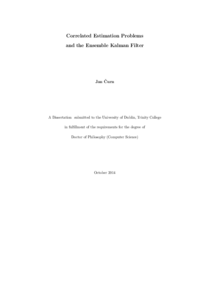Correlated Estimation Problems and the Ensemble Kalman Filter
Korelované estimační problémy a ensemblový Kalmanův filtr
rigorous thesis (RECOGNIZED)

View/
Permanent link
http://hdl.handle.net/20.500.11956/73686Identifiers
Study Information System: 166047
Collections
- Kvalifikační práce [11325]
Author
Faculty / Institute
Faculty of Mathematics and Physics
Discipline
Software Systems
Department
Department of Software Engineering
Date of defense
11. 1. 2016
Publisher
Univerzita Karlova, Matematicko-fyzikální fakultaLanguage
English
Grade
Recognized
Ph.D. Disertace Název: Korelované Estimační Problémy a Ensemblový Kalmanův Filtr Autor: Mgr. Jan Čurn, Ph.D. Abstrakt: Kalmanův filtr je rekurzivní algoritmus, který estimuje stav lineárního dynamického systému ze sekvence nepřesných měření ze senzorů. Díky své relativní jednoduchosti, numerické efektivitě a optimalitě byl Kalmanův filtr a jeho varianty aplikovány na širokou škálu problémů v technologii, zejména v oblasti navádění, navigace a řízení. Tradiční definice Kalmanova filtru je založena na předpokladu, že ve kterémkoli okamžiku jsou chyby v predikci stavu systému a chyby v měření statisticky nezávislé. Bohužel v mnoha praktických problémech tento předpoklad není splněn, tudíž Kalmanův filtr může vracet přespříliš jisté výsledky a divergovat. Toto může mít vážné důsledky v kontextu systémů kritických pro bezpečnost. Přestože existují modifikace Kalmanova filtru, které podporují různé typy korelace v procesním nebo měřícím šumu, tyto modifikace nejsou vhodné v situaci, kde korelace mezi chybami v predikovaném stavu a měřením je způsobena přítomností sdílené minulé informace mezi estimátem stavu a měřením, což je charakteristické v distribuovaných sítích senzorů. Na druhou stranu, existující metody, které se zabývají problémem sdílené minulé informace, buď poskytují příliš konzervativní estimáty nebo...
Ph.D. Thesis Title: Correlated Estimation Problems and the Ensemble Kalman Filter Author: Jan Čurn Abstract: The Kalman filter is a recursive algorithm that estimates the state of a linear dynamic system from a sequence of noisy sensor measurements. Due to its relative simplicity, numerical efficiency and optimality, the Kalman filter and its variants have been applied to a wide range of problems in technology, notably in the areas of guidance, navigation, and control. The traditional definition of the Kalman filter is based on the assumption that at any given time, the errors associated with the predicted state estimate and the observation are statistically independent. However, in many practical problems, this assumption is not satisfied, and as such the Kalman filter may provide overconfident state estimates and diverge. This can have serious consequences in the context of safety-critical systems. Although there are modifications of the Kalman filter that accommodate various types of correlation in the process and observation noises, these are not suitable in the situation where the correlation between the errors associated with the predicted state estimate and the observation is caused by the presence of common past information between the state estimate and the observation, which is characteristic of...
